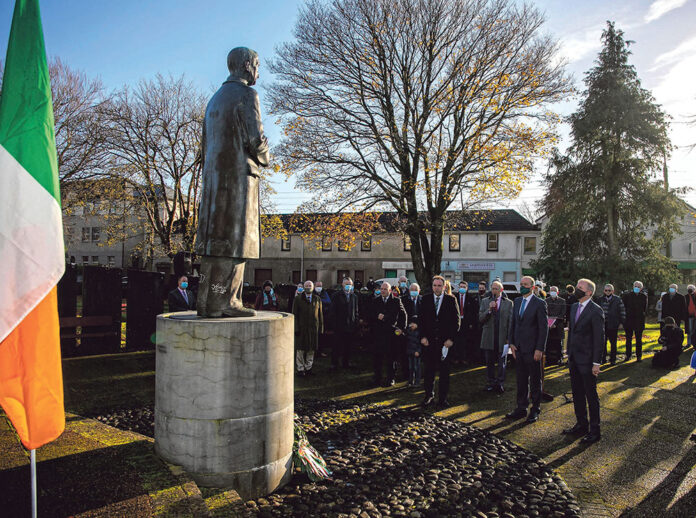Taoiseach lauds ‘revolutionary leader’ at DeValera Commemoration
THE legacy left by founding leader of Fianna Fáil Éamon de Valera was lauded by An Taoiseach, Micheál Martin, at the 40th annual commemoration of his statute in Ennis on Sunday.
Following his release from prison in June 1917, de Valera was elected Sinn Féin deputy for East Clare. During the Civil War of 1922 – 23, de Valera supported the anti-Treaty Republicans. De Valera was arrested on August 15 1923, under the Public Safety Act, as he was about to make a speech at Ennis and was imprisoned until July 1924.
Despite his imprisonment, Clare elected de Valera top of the poll in the 1923 General Election. He continued to represent Clare for the rest of his active political career.
In a wide-ranging oration, Mr Martin stated the life of Eamon de Valera was one of overcoming adversity and remarkable achievement.
“His positive legacy remains strong, and remains central to achieving progress for everyone on our island.
“In July 1917, the people of East Clare lit a beacon in the cause of Irish independence which was seen throughout the world.
“Little over a year after the Rising and the executions which followed, it was here that people were able to give their first expression of support for the ideals of the men and women of 1916.
“Proudly wearing the plain, green uniform which he had shared with his fallen comrades, Eamon de Valera came to this place to speak of an Ireland which could control its own destiny.
“In the face of intimidation and a massive imbalance of resources, his message resonated with the people of Clare and with the Irish people.”
From that campaign onwards, Mr Martin recalled de Valera built one of the great democratic careers of the 20th century. By far the most successful Irish person in winning the free support of the Irish people, de Valera also stands out in the wider democratic world.
Mr Martin described de Valera as a “revolutionary leader, who built a democratic movement, which stood against the extremes of left and right, and reinforced democratic republicanism at times when basic freedoms were being crushed in so many places”.
“A figure of his stature is always going to attract a share of criticism, but the sad reality is that Eamon de Valera has often denied the right to a balanced narrative and is obliged to carry on his shoulders the failures of his time.
“He is the most written-about figure of the last century – but just because we talk a lot about someone doesn’t mean that we understand their importance.
“A very striking thing about de Valera in those years is how often people opposed to him ended up supporting him – which actually included three signatories of the Treaty itself and his opponent in the 1917 by-election.
“He also won the support of the Irish people – who showed an early and constant willingness not to be defined by civil war differences.
“The idea that Irish politics has been defined simply by the civil war is based on dismissing the views of the Irish people and ignoring the fact of major changes in support, programmes and membership.”
The Taoiseach said de Valera’s most dramatic and positive legacy is the republican constitution and how he set a distinct path for Ireland in international relations.
by Dan Danaher

